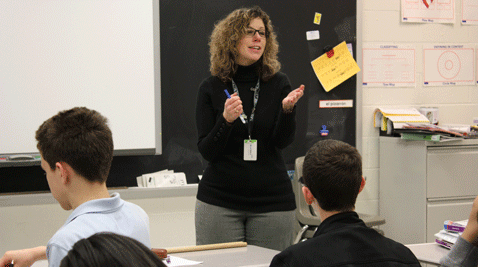ANNAPOLIS – The average salary for Maryland teachers has decreased since 2009, despite an intensified workload from the hastily implemented Common Core State Standards.
Since the 2009-2010 school year, which ended with the adoption of Common Core, the average Maryland teacher has seen nearly a 6 percent decrease in their salary, after adjusting for inflation, according to calculations from data supplied by the state Department of Education.

“Teachers have not been able to negotiate [pay] increases that keep up,” said Betty Weller, president of Maryland’s teacher’s union. “They’re taking home fewer dollars.”
Part of the problem is that many school districts have seen salary freezes that even neglected scheduled raises.
“We’re in a situation in Anne Arundel where there is a revenue cap and there are funding issues,” said Richard Benfer, president of the county’s teacher’s union. He explained that scheduled raises in his county are about 4 1/2 years behind.
Regardless of the freezes, the national teacher’s union ranked Maryland as the twelfth best state for wage increases over ten school years, ending in 2013, according to a report released in March.
While many professions suffered during the Great Recession, teachers faced unique challenges from recent changes to the state’s education policies, which significantly increased their workload.
Common Core — a set of controversial, rigorous, new education standards — was a crucial component of the state’s successful application to receive the $250 million Race To The Top grant. The standards led to a wave of additional work for teachers, often requiring them to construct new curriculums within a small timeframe and with limited resources, among other challenges.
While the federal dollars were not specifically earmarked to go into teacher’s pockets, “recruiting, developing, retaining and rewarding effective teachers and principals” was one aim of the Race To The Top program, according to a report released by the U.S. Department of Education in March.
“Teachers are spending eight hours on Saturday and eight hours on Sunday just to get caught up,” Benfer said. “They’re not paid for that.”
Fort Meade Middle School Spanish teacher Colleen Benda added: “We just work so hard. I don’t think we even realize how much we do.”
Her students also recognized that Benda, an officer in the teacher’s union, is beleaguered.
“I do how much work?” Benda, with 19 years of teaching experience, called out to her class. “Too much!” they replied in unison.
The Maryland State Department of Education declined to comment on the amount of work teachers faced in recent years.
Though the workload was about even for teachers across the state, the average salary change for each school system has varied. However, all but four have shown a decrease.
Kent County Public Schools saw the greatest average salary increase with 4 percent since 2009. The county previously ranked sixteenth of 24 for average teacher salaries and moved up to seventh last October, according to data from the Department of Education. The average teacher salary in Kent County is $65,410.
Dorchester County, however, saw a 13 percent decrease, the most significant in the state, bumping it down two spots to have the lowest average teacher salary in Maryland. Teachers there earn an average $51,680.
The average teacher for the state as a whole for the 2012 to 2013 school year was ranked eighth in the country by the national teacher’s union’s report, with about $64,200.
Calvert, Montgomery and Howard counties had the highest average teacher salaries in Maryland, according to the state Department of Education. The highest average salary was in Calvert County at $75,760.
The lowest were Caroline, Somerset and Dorchester counties. Between all Maryland counties, there was a range of $24,000.
Teacher salaries are determined at the county level and are based on pay schedules that account for both experience and educational attainment. While freezes in these schedules are a large part of the salary decline, other components also weigh in.
One potential cause could stem from teacher inexperience. More than half of the teachers in the state have taught for ten years or less, meaning they fall in some of the lowest pay brackets. Conversely, less than one-third of teachers in 1992 had that level of experience, according to Maryland’s teacher’s union.
Teachers’ pay grade based on their educational attainment, however, most likely is not a large contributing factor for the salary decrease or the disparity across the state.
Somerset, St. Mary’s and Worcester — the three counties with the highest percentage of teachers holding only a bachelor’s degree, the minimum requirement for certification in the state — are scattered in their ranking based on salary.
Additionally, Calvert County, which ranked the highest for 2013 average teacher salary, had the fourth highest percentage of teachers with only a bachelor’s degree.
There is a similar lack of correlation with master’s degree holders, the most common degree held by teachers statewide. Only one percent of teachers held a doctorate, according to data from Maryland’s Department of Education.
Regardless of experience, education level or pay freezes and decreases, Benfer said he believes educators statewide still hold one commitment in common.
“Teachers keep plugging along because they want to do what’s best for kids,” Benfer, who has taught in Anne Arundel County for 21 years, said.
Salary averages supplied by the Maryland State Department of Education were weighted to factor in part-time teachers. Inflation adjustments were found using information from the U.S. Bureau of Labor Statistics. Data about ranking, teacher experience and degree attainment excluded educators for technical or trade classes, as well as the SEED school, Maryland’s public boarding school.


You must be logged in to post a comment.